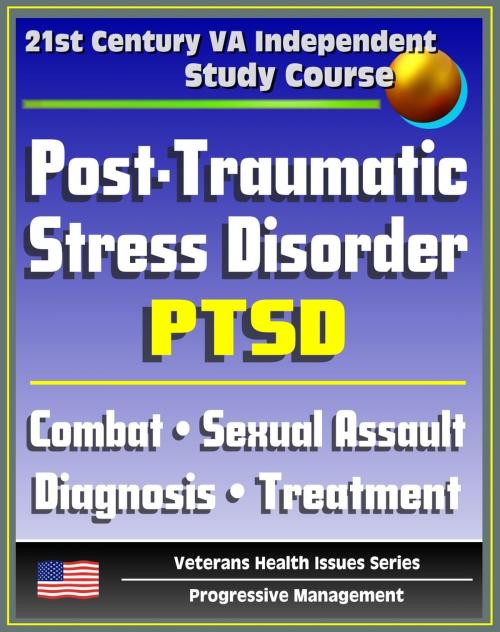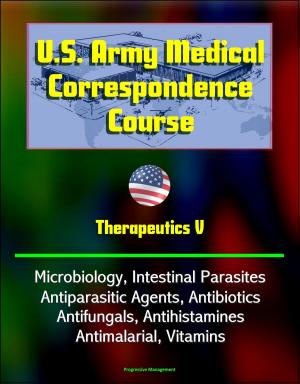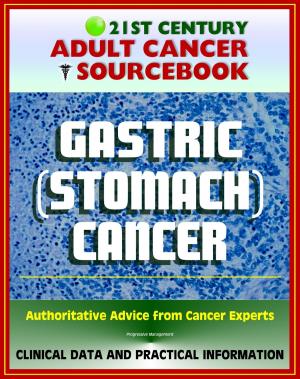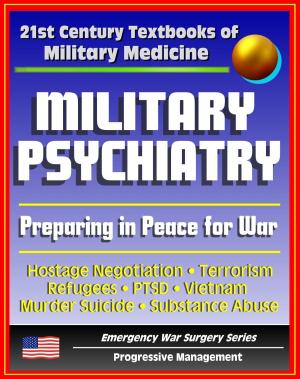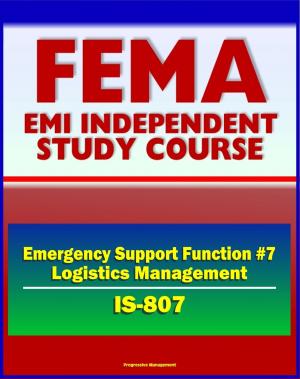21st Century VA Independent Study Course: Post-Traumatic Stress Disorder (PTSD): Implications for Primary Care, Combat, Military Sexual Assault, Diagnosis, Treatment, Medicine, Compensation
Nonfiction, Health & Well Being, Medical, Ailments & Diseases, Mental Health, Health, Women&| Author: | Progressive Management | ISBN: | 9781458180292 |
| Publisher: | Progressive Management | Publication: | February 15, 2011 |
| Imprint: | Smashwords Edition | Language: | English |
| Author: | Progressive Management |
| ISBN: | 9781458180292 |
| Publisher: | Progressive Management |
| Publication: | February 15, 2011 |
| Imprint: | Smashwords Edition |
| Language: | English |
The Veterans Administration (VA) Independent Study Course on post-traumatic stress disorder (PTSD) provides authoritative information on this crippling condition. Upon completion of this self-study program, participants should be able to: integrate PTSD screening into veterans’ assessments; identify the manifestations of PTSD in veterans; describe the current treatment for PTSD; refer veterans with PTSD to appropriate resources; recognize the need to prepare veterans with PTSD for stressful medical procedures; support and encourage identification of veterans with PTSD; and appreciate veterans who have experienced situations that put them at risk for PTSD. As a result of this program, clinicians will have a broader base of knowledge with which to provide effective care to patients with PTSD and a better understanding of patients who experience this condition. Program Content: Why Screen Veterans for Traumatic Stress; Obstacles to Detection of Traumatic Stress-Related Problems; Rationale for Routine Traumatic Stress Screening in VA Health Care Settings; Role of Health Care Providers; The Nature and Impact of Traumatic Stress; Women and Sexual Trauma; Men and Sexual Trauma; Screening and Referral Procedure Overview; Implementing Screening Procedures; Treatments for PTSD; Pharmacotherapy for PTSD; Medical Compliance/Preparation for Medical Procedures; The Patient-Provider Relationship: Setting Boundaries; Special Considerations: The Compensation-Seeking Veteran with PTSD; Models of Care; Commonly Asked Questions About PTSD; Reference Materials; Quick Reference Guide; “Understanding Trauma and PTSD” Patient Information Sheet; Screening Tools; Patient Protection and Advocacy; References; Annotated Bibliography. Medical providers in VA frequently encounter patients with PTSD (often undiagnosed) related to severe prior traumas (especially combat, sexual assault while in the military, prisoner-of-war experiences or childhood physical and sexual abuse). PTSD has profound effects on physical and emotional health and social functioning; it also influences health care utilization and a patient’s ability to interact effectively with the health care system. To increase the identification of PTSD, medical providers should routinely screen for PTSD, using simple available instruments. Medical providers also should routinely screen for exposure to traumas, including combat, sexual assault and domestic violence.
* This edition includes our exclusive Guide to Leading Medical Websites. Since navigating the Internet to find additional non-governmental medical information can be confusing, we've provided this unique and helpful guide with updated links to 81 of the best sites for medical information! Built-in weblinks let you quickly check for the latest clinical updates directly from the government and the best commercial portals, news sites, reference/textbook/non-commercial portals, and health organizations.
* This is a privately authored news service and educational publication of Progressive Management. Our publications synthesize official government information with original material - they are not produced by the federal government. They are designed to provide a convenient user-friendly reference work to uniformly present authoritative knowledge that can be rapidly read, reviewed or searched.
The Veterans Administration (VA) Independent Study Course on post-traumatic stress disorder (PTSD) provides authoritative information on this crippling condition. Upon completion of this self-study program, participants should be able to: integrate PTSD screening into veterans’ assessments; identify the manifestations of PTSD in veterans; describe the current treatment for PTSD; refer veterans with PTSD to appropriate resources; recognize the need to prepare veterans with PTSD for stressful medical procedures; support and encourage identification of veterans with PTSD; and appreciate veterans who have experienced situations that put them at risk for PTSD. As a result of this program, clinicians will have a broader base of knowledge with which to provide effective care to patients with PTSD and a better understanding of patients who experience this condition. Program Content: Why Screen Veterans for Traumatic Stress; Obstacles to Detection of Traumatic Stress-Related Problems; Rationale for Routine Traumatic Stress Screening in VA Health Care Settings; Role of Health Care Providers; The Nature and Impact of Traumatic Stress; Women and Sexual Trauma; Men and Sexual Trauma; Screening and Referral Procedure Overview; Implementing Screening Procedures; Treatments for PTSD; Pharmacotherapy for PTSD; Medical Compliance/Preparation for Medical Procedures; The Patient-Provider Relationship: Setting Boundaries; Special Considerations: The Compensation-Seeking Veteran with PTSD; Models of Care; Commonly Asked Questions About PTSD; Reference Materials; Quick Reference Guide; “Understanding Trauma and PTSD” Patient Information Sheet; Screening Tools; Patient Protection and Advocacy; References; Annotated Bibliography. Medical providers in VA frequently encounter patients with PTSD (often undiagnosed) related to severe prior traumas (especially combat, sexual assault while in the military, prisoner-of-war experiences or childhood physical and sexual abuse). PTSD has profound effects on physical and emotional health and social functioning; it also influences health care utilization and a patient’s ability to interact effectively with the health care system. To increase the identification of PTSD, medical providers should routinely screen for PTSD, using simple available instruments. Medical providers also should routinely screen for exposure to traumas, including combat, sexual assault and domestic violence.
* This edition includes our exclusive Guide to Leading Medical Websites. Since navigating the Internet to find additional non-governmental medical information can be confusing, we've provided this unique and helpful guide with updated links to 81 of the best sites for medical information! Built-in weblinks let you quickly check for the latest clinical updates directly from the government and the best commercial portals, news sites, reference/textbook/non-commercial portals, and health organizations.
* This is a privately authored news service and educational publication of Progressive Management. Our publications synthesize official government information with original material - they are not produced by the federal government. They are designed to provide a convenient user-friendly reference work to uniformly present authoritative knowledge that can be rapidly read, reviewed or searched.
